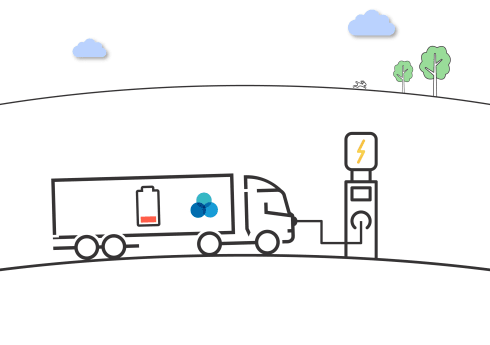Are you ready for electric trucks? How do you choose the right one?
Are 7.5 tonne electric trucks and buses science fiction? Not any more. In fact, they’re already on our streets. Are they right for you? What are the best models? Read our easy guide.
(Updated Wed, 12 July 2023)
By 2040, the combustion engine in Britain will be history.
That’s a sobering thought when you consider that this invention helped to make Britain the world’s number one superpower around a century and a half ago. Yet over the next two decades, the world will move to new technology and all new trucks that are sold in the UK will have to be electric, by law.

How to choose the right electric truck
For some businesses, electric trucks are already the most practical and economical option. For other companies, the technology isn’t quite there yet.
This guide explains what you need to know if you’re weighing up your options.
How heavy are the loads you carry?
The bigger the payload, the more batteries are needed to cover any given distance. But, the bigger and heavier the truck battery, the less weight you have left available for your payload. This means there’s an equation to balance carefully with larger payloads.
Most manufacturers can make realistic route simulations to find out of their vehicle will manage to do what you need.
If you don’t carry heavy tools or equipment and tend to fill up with volume rather than weight, fully electric trucks are a realistic option. Volvo and Scania are the two most advanced manufacturers already selling in the UK.
If you usually carry the full payload for your truck’s weight category, there’s not yet a fully electric truck to meet your needs. This tends to apply to construction companies and some types of waste management, for example. You may find that Scania’s plug in hybrid works for you instead. It automatically switches between electric and diesel, depending on its level of charge and the demands the driver is making of it.
How far do you need to drive?
Electric trucks can currently travel anything from 45 miles to 185 miles on an overnight charge. This wide range depends on the payload, temperature, speed and how hilly the roads are, plus a few other variables.
If your travel distances are within these limitations, electric trucks are still an option. Fully electric trucks are ideal for transporting goods in and around cities, especially is your trucks stick to regular routes and return to the home depot at the end of the day to recharge. Some distribution contractors, city construction companies and refuse collection agents in cities have already started using electric trucks.
At the moment, fully electric truck technology is not really there yet for long-haul transport, and heavy-duty transport applications in the timber, construction and mining industries. Longer distance jobs need charging scheduled at specific locations along the way, in sync with the driver’s working hours. Plug-in hybrids may be the answer for some businesses whilst others may have to wait for a denser public charging infrastructure to develop.
What are your charging options?
With current charge point technology, fully electric trucks need around 9 hours to recharge.
Electric trucks will work well for you if they can charge at your home base or truck depot overnight and get through a working day without recharging.
If your trucks work round the clock, electric probably isn’t for you just yet. Fast DC chargers which can fully charge a truck in 2 hours are a new technology which will soon be a great solution for trucks that are used on two consecutive shifts.
As electric vehicles become more common, we will also need a national network of public charging stations in fuel stations, loading bays, service workshops, truck stops and other places where trucks are parked.
Can you afford driver training and route planning?
Like the fuel consumption in a diesel truck, the distance you can get out of a single battery charge in an electric truck can vary quite a lot depending on the way it’s driven. To get the best performance, you need to recuperate energy and maximize range.
If you have the budget and company flexibility, you can train your drivers to use electric powertrain technology in the most efficient way and also help them plan the most economical routes.
Where do your trucks operate?
Electric trucks are a godsend in cities and residential areas because they’re almost silent and don’t belch out smelly exhaust fumes. Anyone who has spent a day in London and come home to find black stuff up their nostrils will relate!
For this reason, electric trucks are ideal for waste collection companies, light construction works and for delivery of consumables to shops.
Haulage and motorway transport is less convenient in electric trucks as there isn’t yet enough recharging infrastructure or a choice of models with the distance range that’s needed.
Are there zero emission zones planned in your usual working areas?
Many cities, like Birmingham, Bradford, Sheffield, Bristol and more, already have Clean Air Zones, which means uncompliant vehicles are not allowed to enter or they have to pay a charge to drive in these zones. Then, there’s London’s ULEZ, which is even more restrictive. More cities plan to add such restrictions in the future.
Taxes are also being discussed which will penalise fossil fuel users and subsidise the transition to carbon-neutral road transport.
Do you bid for contracts with companies that have a sustainability agenda?
Electric trucks can help you lower your carbon footprint as a company and boost your brand image. A growing number of private companies and government agencies have strong sustainability goals. They are more likely to give contracts to companies that have a lower carbon footprint or can operate with silent vehicles.
If brand image is a priority, or if you often pitch to organisations with defined environmental goals, electric trucks may help boost your top line.
Could you offer night-time urban deliveries?
London and some other cities are shifting to using electric trucks in the night, to make deliveries and even collect waste. The same work can be done in less time when there’s little other traffic about, and the reduction in peak traffic volumes is a goal that many cities have been trying to achieve for decades.
If you can offer this service, you could get a seriously strong competitive edge. The number of new business opportunities in “green partnerships” is set to grow very fast for companies that can transport goods to locations and at times that are no longer feasible with diesel trucks.
Still using diesel for now?
iCompario can help you find the most economical fuel cards in the UK to keep your trucks on the road for as little as possible.

Some general questions about electric trucks
How do I recharge an electric truck?
Most electric trucks can be charged with an AC charger at up to 43 kW or with a DC system which has a capacity of 250 kW. When you buy an electric truck, the charging equipment is usually provided along with it by the manufacturer.
How long does it take to fully charge a truck?
Using an AC charger it takes around 9 hours to fully charge an electric truck, and with a DC charger it could be as little as 2 hours.
The battery will get up to an 80% charge quickly and then slow down for the last 20% to extend the usable lifetime of the battery. (Smartphone batteries work in exactly the same way).
What distance can a fully charged truck travel?
The current state of truck battery technology gives somewhere around 250 miles on a single charge. Bear in mind that this can vary a lot. Factors that will affect this include the weather and wind resistance, the weight of the payload, the speed and roads you use and the driver’s driving style.
As with fossil fuel vehicles, there are electric truck models that have “economy” settings which either train or force the driver to use a more economical driving style. You can also maximise the range by following the charging instructions to the letter.
Some manufacturers of electric trucks, and of charge points, provide apps to track and plan the use of electric trucks so you can analyse and improve charging patterns over time.
How can you make sure a truck battery doesn’t lose capacity over time?
The main way to prolong battery life is to follow the charging and driving guidelines from the manufacturer. Different manufacturers offer different guarantees on vehicle batteries and we advise you to check and compare the conditions carefully.
Do electric trucks really produce zero emissions?
Electric trucks – and all electric vehicles – produce zero tailpipe or exhaust emissions. There are some “emissions” released during production, and from the tyres, brakes and road surface when driving.
What is the difference between a battery electric vehicle, and fuel cell technology?
A battery electric vehicle (BEV) uses energy, stored in vehicle batteries, that comes from the national grid.
Fuel cell electric vehicles (FCEV) are powered by hydrogen that is converted to electricity while the vehicle is being driven.
What is the climate impact of an electric truck compared to a diesel model?
To answer this you need to look at the total life cycle of the vehicle, including the raw materials that make it, its production and its usage.
In general, electric trucks do emit more CO2 while being made, but much less when being driven. The biggest variable will be the source of electricity you have from your provider. Is it mainly generated from wind power, solar energy, nuclear power stations or coal? This will by the main factor in the environmental impact of an electric truck.
Do electric truck batteries contain “conflict minerals”?
Lithium ion batteries contain certain scarce materials such as heavy metals and rare earth metals including tantalum, tungsten, tellurium, gold and cobalt. Some of these come from conflict zones and the money goes to armed groups. It is worth asking manufacturers to explain their supply chain if you wish to know whether your electric truck may contain conflict minerals.
Some of the best electric trucks already available in the UK and Europe
Volvo: three heavy duty and three medium duty electric trucks
Volvo Trucks now has six electric models, three medium duty and three heavy duty.
- The Volvo FM Electric is described as a ‘highly flexible truck for regional transportation’ with lower sound and emissions and excellent ergonomics and visibility.
- Volvo FMX Electric is a robust and reliable truck for supporting building infrastructure with minimal disturbance. Volvo claims is it ‘smooth to drive with an onsite safety focus’.
- The Volvo FH Electric is designed for heavy deliveries between and around cities.
Scania: electric buses and plug-in hybrids as well as fully electric trucks
Scania already offers electric buses as well as plug-in hybrid trucks. These offer a great intermediate option for companies that need more of a public charging infrastructure before going fully electric is feasible.
The Scania plug-in hybrid truck offers fully automated switching between combustion engine and electric operation, up to 60 km of electric range and both regenerative and external charging with the power to reach an 80% charge in just 35 minutes.
Coming soon? Volta and Tevva electric trucks in the UK
Volta is a Scandinavian company with a presence in Sweden, France and the UK, established as a pure electric vehicle specialist. It aims to have prototypes by the middle of 2022 and begin manufacturing at the end of next year.
Tevva This is another outsider, registered as a British company and so far a bit of an unknown quantity. It claims to have designed a 7.5 tonne electric truck which will have a chassis made in China but with assembly and additional components added in the UK. It says its truck will offer a range of up to 160 miles on one charge in the pure battery electric vehicle (BEV) form or up to 310 miles with its ‘patented range extender technology (REX), which has now been upgraded to use hydrogen fuel cells’. It is taking orders and deposits already but the first products will not be ready till autumn 2022.
Still using diesel for now?
iCompario can help you find the most economical fuel cards in the UK to keep your trucks on the road for as little as possible.
Read more on iCompario

Data Reveals that Unqualified Drivers Are Considering Driving Illegally Due to High Learning Costs


